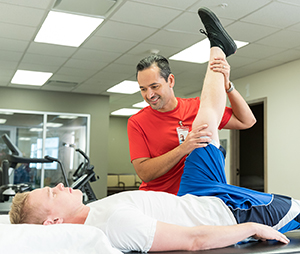Outpatient Rehabilitation
When you're recovering from an illness, surgery, or injury, you may need outpatient rehabilitation. This means you'll get 1 or more types of therapy after you leave a hospital or clinic. You may go to an outpatient rehab facility. Or in some cases, treatment may take place in your home. The goal of this rehab is to help you heal and get back to your everyday activities.

Outpatient rehab after an accident or injury
As part of your recovery, you may start by getting care at a hospital. You may then move to outpatient treatment. Depending on the nature and extent of your injury, your treatment might be given by physical therapists. They will help you get back muscle control and function. Or you may see a speech therapist. An occupational therapist can help you relearn how to go about your daily life. You might need other specialists, depending on your situation. A physiatrist may help plan and evaluate your rehab. A physiatrist is a healthcare provider who is a rehab expert.
Outpatient rehab after surgery
Outpatient rehab is needed after many surgeries, such as a knee replacement. In this case, you will likely need a physical therapist to help you learn how to walk with your new joint. They can teach you special exercises to help build up the muscles around your knee or other joints. As you heal, they will lead you through sets of these exercises. The therapist may have you use equipment, such as a stationary bike, to build up your strength. They may also advise other activities, such as swimming or water aerobics, after your recovery.
Outpatient rehab after an illness
You will often need outpatient rehab if you have a serious illness like a heart attack, stroke, or cancer. In these cases, your treatment will often start in the hospital. When you start to get better, you will likely change to a program of occupational and physical therapy. You may also have supervised aerobic conditioning exercises a few times a week while at home.
Some illnesses, such as stroke, may need a combination of rehab programs. For instance, you may need a speech pathologist to help you learn to speak again. You may also need a physical or occupational therapist to help you learn how to walk and go about your daily activities.
Outpatient rehab therapy for drug and alcohol abuse or addiction
When you're recovering from addiction, you may get counseling at a facility before going home. After that, you'll keep getting counseling or medicine as an outpatient. You shouldn't feel embarrassed about or ashamed of your rehab. Drug addiction and abuse are common diseases. Getting help is the first step to taking back control of your life.
Outpatient rehab for mental illness
Many mental health problems may be treated with rehab. These include depression and eating disorders. This kind of rehab is given by psychologists, psychiatrists, or counselors. For instance, a therapist can help you find the cause of your depression. Then they can help you notice and change negative patterns of thinking. This can help you get back your sense of vitality and pleasure in life.
Challenges of outpatient rehab
In many cases, people going through outpatient therapy have had a severe accident, sickness, or other crisis that has turned their life upside down. It can be overwhelming and exhausting to figure out how to adapt from being in a hospital to living in the world at large.
Having trusted therapists to help you through every aspect of rehab—both physical and emotional—is vital. Often, you'll also need 1 or more caregivers to help you move from inpatient to outpatient care. They will aid in your overall recovery.